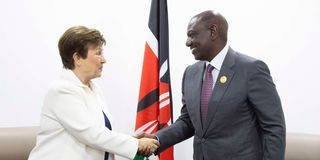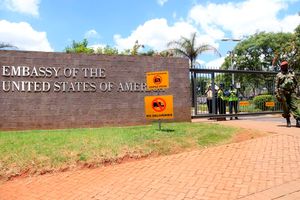
President William Ruto meets with IMF Managing Director Kristalina Georgieva.
The International Monetary Fund (IMF), now blamed for the pressure to hike taxes in Kenya, and which has led to mounting protests by youth, suggests that the answer to the chaos lies with Nairobi itself.
A senior official at the Fund told the Nation that the lender will not back down on the conditions it has imposed on Kenya to iron out things in revenue spending as one long-term goal of easing the debt burden.
But as for the specific pain expressed by protesters? The Kenyan government must cut out extravagance and instill discipline by actually spending money where it matters.
“There is a lot of luxury in government, which we found to be the real cause of pain to the people,” said a source at the IMF who asked to speak anonymously as the Fund has not yet issued an official response.
“That can free up lots of money to go to the targeted social and development programmes. There lies the problem and a solution lies within.”
'Not IMF's fault'
The official swatted away blame directed at the Fund for what some see as its role in the eruption of protests. The official then directed the Nation to the ‘frequently asked questions’ section of the IMF website.
Some past IMF programmes tied to budgetary support for Kenya have caused problems before, including criticism and actual street protests last year after the government was advised to reform some tax laws, launch a housing levy and remove subsidies on fuel.
At the time, the IMF raised concerns about violence but said it was a long-term goal to ease the debt burden on Kenya, besides blaming the pain on external shocks beyond Kenya’s abilities.
“These trade-offs can be mitigated by protecting and enhancing social and development expenditures. In this regard, the authorities’ social initiatives, including the Financial Inclusion Fund (“Hustler Fund”), affordable housing, and the expansion of water infrastructure respond to these social needs,” the Fund said back in January.
With new tax proposals, IMF has often insisted there is a need to broaden the tax base and strengthen revenue collection, which means going for tax cheats as well. It had proposed linking mobile money transfer details to tax registers, something MPs rejected on Tuesday. Instead, they offered a route via court orders for the taxman to access the records over privacy fears.
These revenues from taxes, and levies, are supposed to provide important resources to support “additional government spending aimed at protecting Kenyan households in the face of recent domestic and global shocks,” IMF argued ahead of this year’s Budget.
“Continued fiscal consolidation is also critical to reduce expensive debt and reduce external vulnerabilities, while mobilising important resources to address Kenya’s developmental needs.”
Nairobi, however, thinks the solution lies elsewhere: a new debt architecture. Government officials have this week argued unsuccessfully for an understanding on where the money collected is going: paying debt.
Ali Mohamed, the Special Envoy on Climate Change, said over 67 per cent of the national revenue is going to debt repayment, a result of what he said were “effects of unfair global financial system and debt burden that leaves nothing for investment in social and productive sectors.”
“Global peace and prosperity is tied to peace and hopes for the millions of the jobless Africa youth. Urgent action needed to address debt crisis and financial reform.”
Ndii: 'Debts keep us up at night'
David Ndii, the economic advisor to the President has argued against wastage too but says it is debt repayments that “keep us awake at night.”
“One slip and it is financial meltdown,” he posted on X this week.
However, the political impact of those economic reasons, as well as the perceived arrogance of government officials has drowned them out as more numbers poured in the streets this week.
Hours after protests turned violent, the UN and the African Union separately raised concerns about deaths and injuries, and called for dialogue. Antonio Guterres, the UN Secretary General said urged Kenyan authorities “to exercise restraint, and call for all demonstrations to take place peacefully.
Moussa Faki Mahamat, the Chairperson of the African Union Commission, appealed to “national stakeholders to engage in constructive dialogue to address the contentious issues that led to the protests in the supreme interest of Kenya.”






